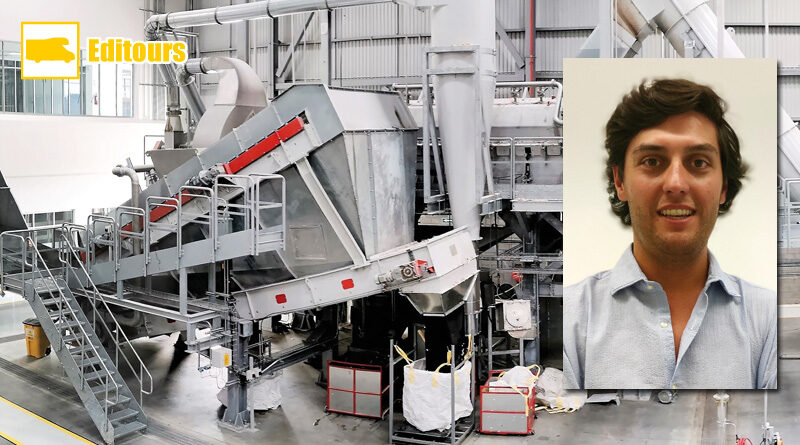Sorting, washing and grinding
Sorting, washing and grinding are vital elements in the processing of PET bottles. PETplanet insider visited Sorema the specialist company in washing and mechanical recycling plants, whose latest development is providing tailored water treatment equipment to reduce recycling plant needs. In Italy, PETplanet spoke to Ottavio Previero, Sales and Marketing Manager.
July 2022 // We met: Mr Ottavio Previero, Sales and Marketing Manager at Sorema, and Mrs Chiara La Donna, Marketing
More than 100 years ago, Ottavio’s great-grandfather founded the Previero company for the pre-grinding of wood. In 1974, the plastics washing division was created under the name Sorema. They initially started with a washing plant for LDPE and by 1982 had already built their first PET facility.
The latest developments in Sorema’s PET washing plants is the upgrading of the bottles pre-washing system. This not only washes the bottles after dry pre-sorting but also removes the labels and sleeves. Washing removes all external contamination, which can also include sand and grit in addition to organic material.
The next stage involves the grinding of bottles into flakes using wet grinders. Depending on local conditions, oil residues and other synthetic adhesions are washed off as well as any remaining organic components. After drying and sorting, the flakes are ready for further processing, hot washing, rinsing and drying.
Sorema offers its customers full scale recycling and washing trials, in its pilot plant, to determine the mass balance and see the final output quality.
However, for Ottavio, costs are just as important as delivery top quality flakes. “We can wash everything using our technology but a recycler must also keep an eye on costs. We therefore adapt our facilities to match the quality of the post-consumer waste stream, making them ideal in terms of costs and excellence. We have focused on wastewater treatment as a way of keeping costs in check and are offering customised solutions through our newly acquired subsidiary company Teknodepurazioni”.
Teknodepurazioni Aquae is a specialist industrial wastewater treatment business, with years of experience to control the water quantity and quality between wastewater plants and washing plants for PET or other plastics. The company carries out tests, laboratory analyses and pilot plants to be able to propose the best solution for each specific application in terms of functionality, economy and ease of management. In its own analysis and research laboratory, Teknodepurazioni Aquae determine the chemical-physical and bacteriological properties of the water before and after the purification process.
Depending on the requirements, wastewater is treated in three stages. These stages are mechanical filtration, followed by chemical sedimentation and finally biological treatment. Process selections is made on the client’s requirements, such as the characteristics of the area or the discharge specifications. After a final-fine treatment, the purified water can be discharged into the river, in the sewer or even reused.
At the two locations Alzate Brianza and Anzano del Parco in Como, Italy, 110 workers produce Sorema equipment on an area of 11,000 m2. To date, hundreds recycling plants have been installed worldwide, which recycle post-consumer and industrial plastics waste all around the year.
Shortly before our visit, at the beginning this month, a bottle-to-bottle recycling plant was sold to Mexico. This turnkey plant was shipped to the Mexican recycler Envases Universales for increasing the production capacity of rPET flakes for food applications. With an output of 9,000 kg/h of washed PET flakes, provided by the local municipal bottle collection of bottles, this plant helps to drive the circular economy with rPET by reintegrating the material into the production of new containers, preforms and bottles.
The bottle-to-bottle rPET line contains automatic feeding, pre-washing, de-labelling, followed by the wet grinding, hot washing, flotation and finally rinsing and drying steps. The line includes colour and materials detectors for bottles and flakes as well as a Sorema Scada 4.0 digital monitoring system for an efficient local and remote control.
We thank Chiara and Ottavio for their time and kind hospitality and are looking forward to meeting them again at the K’ show in Düsseldorf.

